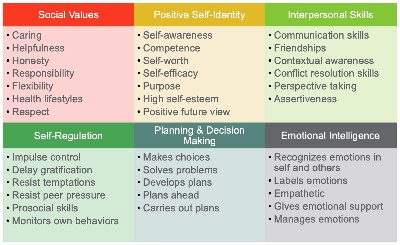Question
What is social competence and what are its elements?
Answer
What is Social Competence?
Social competence is helping children understand themselves so that they can better work with the people around them and better understand the world around them. Kids with social competence really have it put together. They get along great with others, have friends, and appreciate new experiences. These are kids that are socially put together. However, it doesn't just happen. This is something that we work for. As people who work with young children, we help them develop social competence through social experiences and our interactions with them. We need kids to have skilled adults in their world to help them develop social competence. It is probably clear to just about anybody who has worked with young children for any length of time, we can't guarantee that children are always getting this type of experience within their homes. It's hopeful that children have good quality early childhood experiences so that they can develop this social competence.
Elements of Social Competence
These are the skills and characteristics that we hope that children develop. Figure 1 shows some broad categories and specific skills or values that we see within those different areas of social competence. These are areas in which we are helping children develop. It's not just going to happen. We need to make sure that kids have great experiences so that they can become socially competent.

Figure 1. Elements of social competence.
We want children to have social values. We appreciate honesty in our culture. We appreciate children being flexible in their thinking and being caring. Those are skills that we have to let children practice through different interactions and situations. These may be situations that we set up for them to experience. We want children to develop a positive self-identity. Kids have to become aware of who they are. We'll talk more about self-awareness, self-worth, and self-esteem in a bit. We want kids to have a good positive view of who they are so that they can be successful in their future relationships and their academic careers.
We also want kids to have great interpersonal skills. We want them to be able to get along with other people. A great indicator of a child who is socially competent is when other children name them as a friend. Other children see that they have social skills that allow them to develop friendships. You want to cultivate and help children develop these skills as you work with them. Conflict resolution includes helping children learn how to solve their own issues with one another. It's okay if kids are squabbling because that's how they're going to learn how to negotiate and come to a solution that works for both people. To develop those interpersonal skills, you have to have a good social environment.
We also want kids to be self-regulated, being able to regulate their own emotions and resist temptations. Right now, there is some snow on the ground where I live and it's very tempting for young children to step in the snow and kick it. Sometimes parents don't want their children to be in the snow because it makes their shoes wet. It is difficult for children to be able to resist stepping in the snow when they've been told, "Don't step in the snow in those shoes." It's hard for kids to wait for something and delay gratification. If you've ever been with a toddler at a restaurant you know how hard it is for them to wait for their meal to come. You usually have some sort of distraction to help children as they wait for their meal or sometimes restaurants are great and bring the children's meals out first so that they don't have to wait. Those are some practices that we have to work with young children so that they can learn to wait. Children aren't programmed to wait. They have to learn how to wait and that helps them function within their social world.
Other skills we want children to have are pro-social skills. We want them to be able to do things that are kind to other people without the expectation of something in return. We also value children making plans and making decisions. Give children the option to make choices and let them experience the consequences of those choices. Give kids opportunities to solve problems. An adult's role in children's lives isn't to make everything easy, it's to help them learn so that they can be successful on their own, not so that they have to wait for an adult or always rely on an adult for assistance. Allow kids to choose what center they want to play in, what game they want to play, and how they want to play the game. Those things really do help children develop social competence.
Lastly, we want children to be emotionally intelligent. We want them to be able to recognize emotions within themselves and be able to label them. We want them to be able to recognize when their friend looks sad because they know what people look like when they're sad and they want to help them. We want them to know what to do because they've had people help them when they're sad.
Having said all that, again, we have to make sure that kids have lots of opportunities to experience the social world and experience situations that they're going to have to make a decision or make a plan to solve. That's a huge job as early childhood professionals to provide opportunities and experiences so that children can function without us, which is the ultimate goal.
This Ask the Expert is an edited excerpt from the course, Helping Young Children Develop a Positive Sense of Self, presented by Amber Tankersley, PhD.
